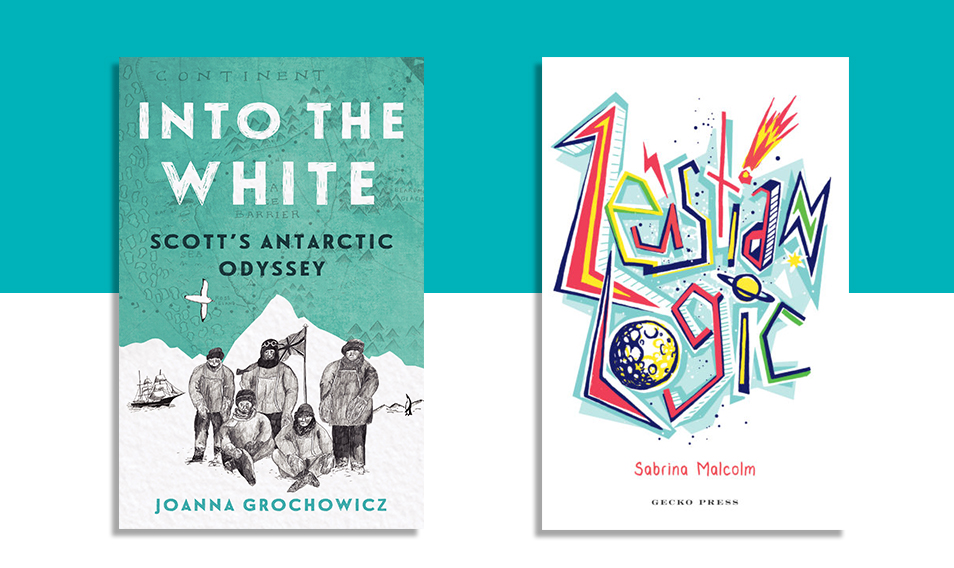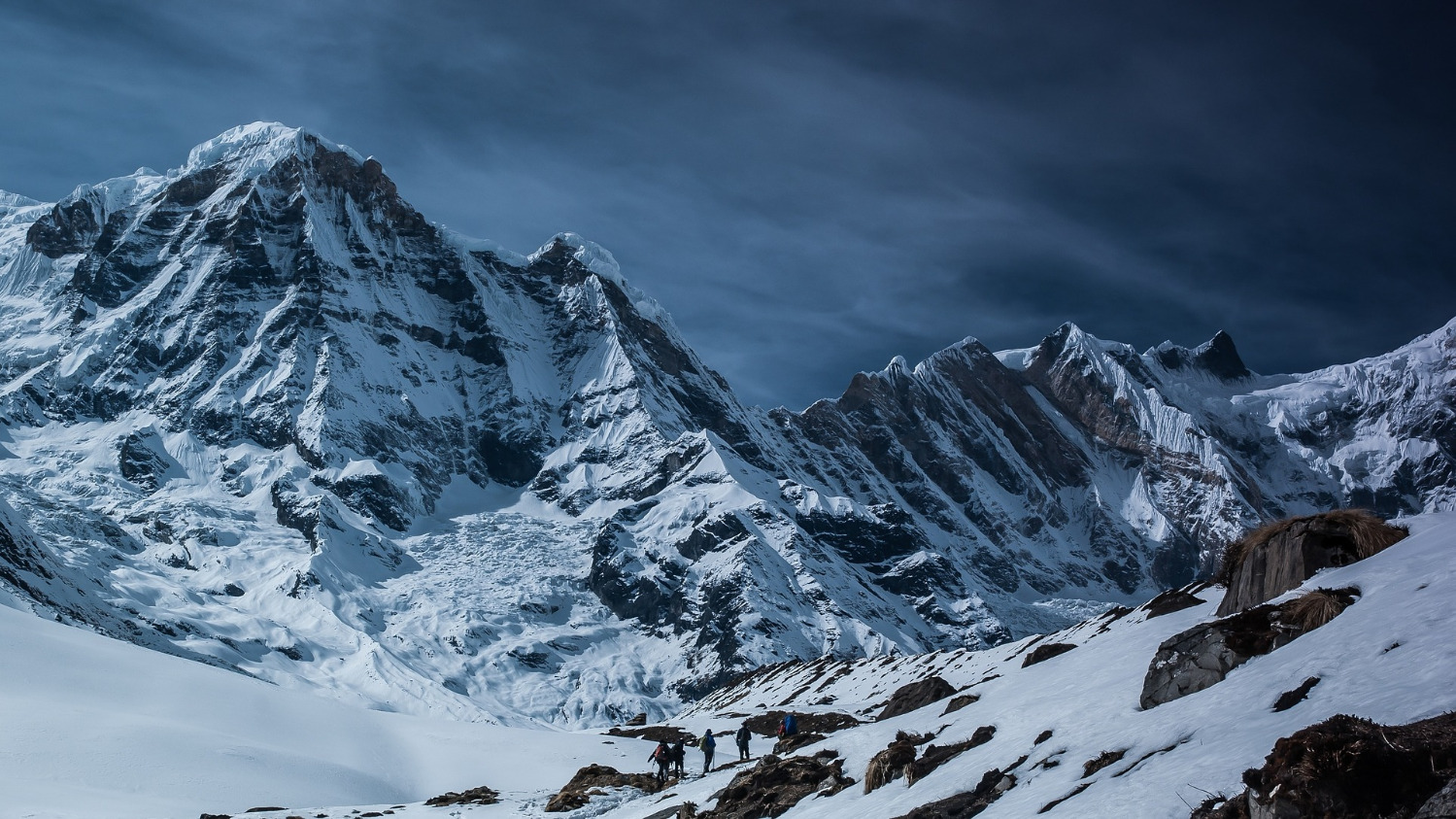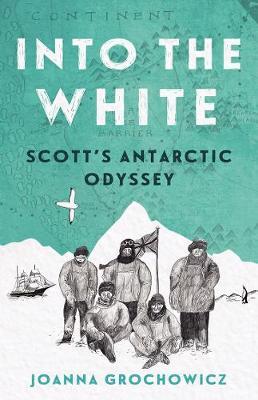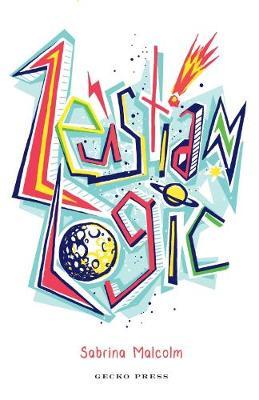Sarah Forster reviews two recent books, both by debut authors, which are tied together by adventure and its aftermath. Both books go deep inside the emotional experience of dramatic, unpredictable death.
Into the White is a retelling for children of Robert Falcon Scott’s Antarctic expedition. We all know how it ended, but how did it begin? And what did they need to go through to get there? This is a creative work of biography pitched at 10+.
The lead character’s father in Zeustian Logic was an Everest guide, lost in a blizzard on Everest under strange circumstances about a year prior to when our book begins. It could perhaps be the story of Scott’s son – though he was much younger when his father died for his work and passion. (Check out our interview with Sabrina Malcolm.)

You may think you know the story of Robert Falcon Scott, the man who reached the South Pole – second – and failed to return. But until you read the fantastic Into the White, you don’t understand the trials that come with such a feat – the reader is truly carried along.
We begin in the ship, as the journey’s photographer struggles again to develop his photographs of the journey, the developing chemicals jolting and sloshing. A storm is brewing, which leads to the dumping of ten tonnes of coal overboard, to help the ship to stay afloat. As we reach Antarctica, the men then unload and set up the pre-fab hut in which they hope to spend the winter.
The men are there with ponies and dogs, to help hauling the sleds with supplies, and the first action they must take after setting camp is laying down supply pods to keep Scott’s team going the following summer, during their assault on the Pole. Grochowicz tells the story in third-person, but clearly makes extensive use of Scott’s diaries and those of others on the exhibition. Her talent for description of the icy plains takes the reader there, alongside these men who toiled for glory.
Here’s a quote is from a particularly dramatic scene. A three-man team had gone, in the middle of the dark winter, to retrieve some Emperor Penguin eggs to study their gestation – but are they all going to return?
‘A fearful howl tears through the air. Another blizzard. It sucks at the canvas roof. The fabric makes a booming sound as it whips up and down. Each time the canvas is sucked up, the vacuum effect pulls more cold air and snow through cracks in the rocky walls. Every available piece of clothing is stuffed into the crevices.’
‘Another blizzard. It sucks at the canvas roof. The fabric makes a booming sound as it whips up and down.’
While the Scott expedition was mainly exploratory, for the glory of Great Britain, Scott was not unaware of the contribution of his team to science, and how important it was. Upon being dangled into a crevasse to save some dogs, he considers how he enjoys ‘exploring new frontiers, extending the limits of current thinking.’
While the journey was tough, Grochowicz has a talent for bringing in levity against the bleak white. She describes a winter lecture series (so English!) and the men slipping away before the lecturer could ask them anything – even Scott, usually an assiduous student, was asleep. Her observation of the animal teams and horses – and the way in which the humans on the trip justified their treatment and deaths – are done with care. There were strong bonds between some men and their pack-ponies, and Scott understands that they must treat their animals humanely.
I would recommend this book to anybody with a sense of adventure, but it is pitched at the 10+ age group. I think it would be a great book for reluctant readers, perhaps sports-mad kids, as the true story element will engage them readily. I was utterly transported by the story and the writing, and I can’t wait to see what Grochowicz tackles next.

My most recent reading pile shows a predilection towards YA about the death of somebody close, and the repercussions that this has amongst family and friends. In Zeustian Logic’s case, it is the death of a father.
Tuttle is an astronomy nut (not an astrology nut – though he admits the stories are pretty cool): his first word was Tuttle, so though his given name is Duncan, he has never been known by anything else. His dad is missing in action on Mt Everest, having disappeared under suspicious circumstances. He was leading a climb, and it appears from reports that he deliberately left a paying customer behind when descending a mountain in terrible conditions.
Tuttle is holding the home fort. While his mum is around, she isn’t really: Tuttle is clothing, feeding, and parenting his seven-year-old brother Fen. His mum is still in an incapacitated state of grief, nine months after his father disappeared. Tuttle is frustrated and beginning to get angry, and this is making him irrational. He talks to a tabloid-type reporter about his father, then realises what he has done and starts to unravel – with a bit of help from our antihero, next-door neighbour and car enthusiast (boy-racer) Boyd.
Sabrina Malcolm has taken some risks with the delivery of this, her first YA novel. I admire all writers who can write immersively in the first person, and the voice of a grieving teen is well-captured. Tuttle’s friendship with Attila (the Pun) is genuine and written in an interesting way, through pop-outs within an online messaging system. Amusingly for word nerds, Attila gets obsessed with anagrams partway through and changes his handle to ‘Mystic Parka’ – but ‘Zeustian Logic’ is constantly Tuttle’s. I wonder whether the friendship was once written long-distance, or whether this system is simply there to allow Tuttle to write things he may not be able to say aloud.
I admire all writers who can write immersively in the first person, and the voice of a grieving teen is well-captured.
Tuttle channels some of his frustration into his hobby of astronomy: the depth of his knowledge of constellations is told in memories of his father teaching him, and stories he tells to his brother, Fen. He also uses it as a way to explain the inexplicable: the actions Zeus took against most of his fellow gods and subjects being similarly inexplicable – mainly he just threw them into the sky if they did something stupid.
The sense of setting was strong, down to street names in Kelburn, and while reading I reflected how unusual it was that a book written in New Zealand was set definitively in one place. As Gecko Press publishes their work internationally, this may prompt a new round of the #movingtonz hashtag.
Tuttle goes to school as well, with most of the action from school being around the study of a ‘Chosen Text’ in English, and butting heads with Boyd. His mate Attila has chosen to go off-piste, writing an entire novel himself simply so he can rebel and choose his own text to study – which provides a bit of light relief as Tuttle struggles with his own processing of his father’s death.
I was a little dissatisfied with the lack of finality around the death of Tuttle’s father, which he had been seeking truth about for the entire book. So while Zeustian wasn’t all the way there for me, I reckon for its audience it will hit the mark. I can see a 12–17 year old book-lover (particularly an astrology or myths and legends lover) devouring this, and I look forward to seeing what Malcolm comes up with next.
We don’t see enough new blood in the YA group in New Zealand – or in any group really, thanks to straitened times for publishers – so it will be wonderful to watch Malcolm grow as a writer in coming years.

Into the White: Scott’s Antarctic Odyssey
By Joanna Grochowicz
Published by Allen & Unwin
RRP $19.00


Sarah Forster has worked in the New Zealand book industry for 15 years, in roles promoting Aotearoa’s best authors and books. She has a Diploma in Publishing from Whitireia Polytechnic, and a BA (Hons) in History and Philosophy from the University of Otago. She was born in Winton, grew up in Westport, and lives in Wellington. She was a judge of the New Zealand Book Awards for Children and Young Adults in 2017. Her day job is as a Senior Communications Advisor—Content for Te Herenga Waka—Victoria University of Wellington.



